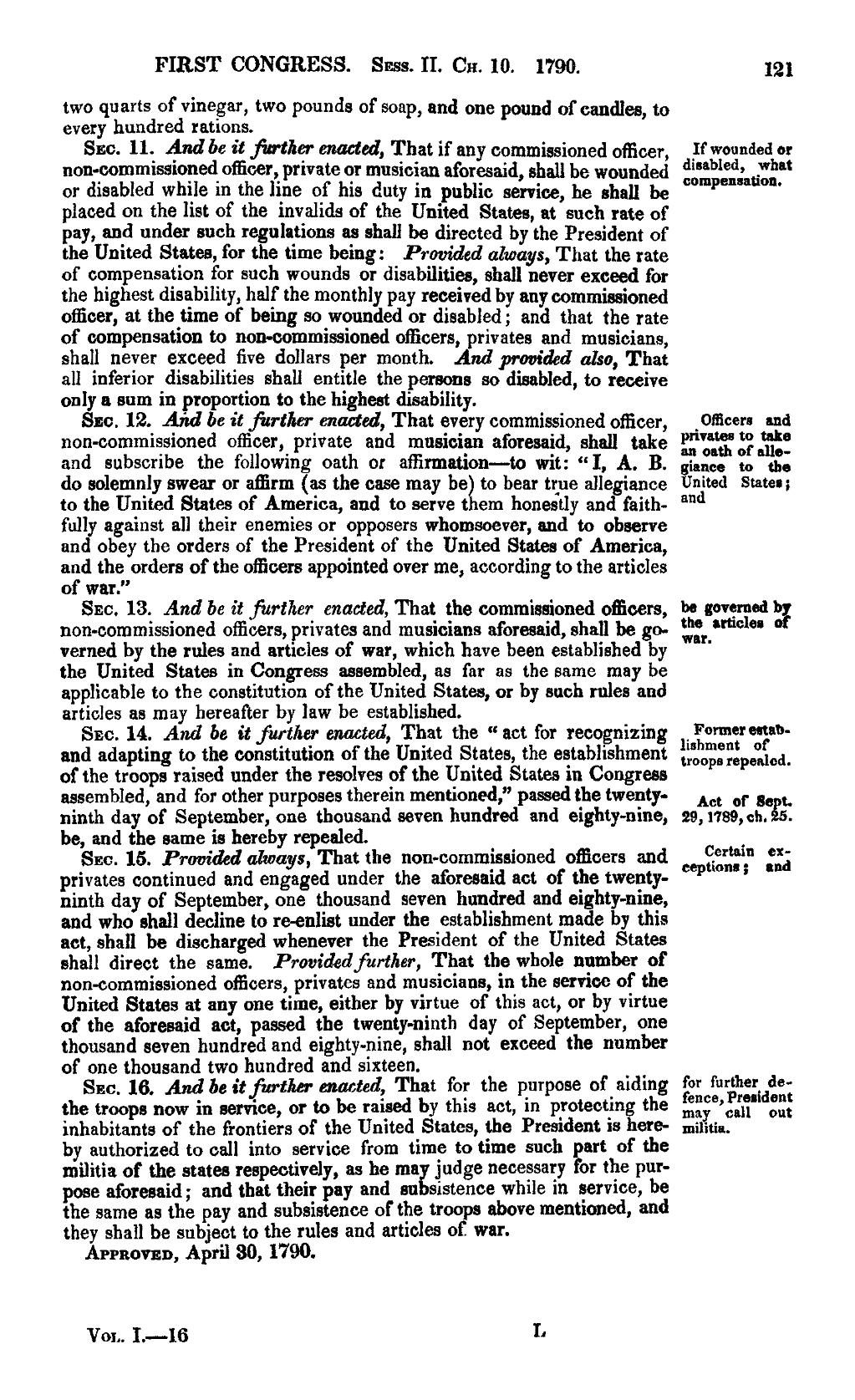two quarts of vinegar, two pounds of soap, and one pound of candles, to every hundred rations.
If wounded or disabled, what compensation.Sec. 11. And be it further enacted, That if any commissioned officer, non-commissioned officer, private or musician aforesaid, shall be wounded or disabled while in the line of his duty in public service, he shall be placed on the list of the invalids of the United States, at such rate of pay, and under such regulations as shall be directed by the President of the United States, for the time being: Provided always, That the rate of compensation for such wounds or disabilities, shall never exceed for the highest disability, half the monthly pay received by any commissioned officer, at the time of being so wounded or disabled; and that the rate of compensation to non-commissioned officers, privates and musicians, shall never exceed five dollars per month. And provided also, That all inferior disabilities shall entitle the persons so disabled, to receive only a sum in proportion to the highest disability.
Officers and privates to take an oath of allegiance to the United States; andSec. 12. And be it further enacted, That every commissioned officer, non-commissioned officer, private and musician aforesaid, shall take and subscribe the following oath or affirmation—to wit: “I, A. B. do solemnly swear or affirm (as the case may be) to bear true allegiance to the United States of America, and to serve them honestly and faithfully against all their enemies or opposers whomsoever, and to observe and obey the orders of the President of the United States of America, and the orders of the officers appointed over me, according to the articles of war.”
be governed by the articles of war.Sec. 13. And be it further enacted, That the commissioned officers, non-commissioned officers, privates and musicians aforesaid, shall be governed by the rules and articles of war, which have been established by the United States in Congress assembled, as far as the same may be applicable to the constitution of the United States, or by such rules and articles as may hereafter by law be established.
Former establishment of troops repealed.Sec. 14. And be it further enacted, That the “act for recognizing and adapting to the constitution of the United States, the establishment of the troops raised under the resolves of the United States in Congress assembled, and for other purposes therein mentioned,”Act of Sept. 29, 1789, ch. 25. passed the twenty-ninth day of September, one thousand seven hundred and eighty-nine, be, and the same is hereby repealed.
Certain exceptions; andSec. 15. Provided always, That the non-commissioned officers and privates continued and engaged under the aforesaid act of the twenty-ninth day of September, one thousand seven hundred and eighty-nine, and who shall decline to re-enlist under the establishment made by this act, shall be discharged whenever the President of the United States shall direct the same. Provided further, That the whole number of non-commissioned officers, privates and musicians, in the service of the United States at any one time, either by virtue of this act, or by virtue of the aforesaid act, passed the twenty-ninth day of September, one thousand seven hundred and eighty-nine, shall not exceed the number of one thousand two hundred and sixteen.
for further defence, President may call out militia.Sec. 16. And be it further enacted, That for the purpose of aiding the troops now in service, or to be raised by this act, in protecting the inhabitants of the frontiers of the United States, the President is hereby authorized to call into service from time to time such part of the militia of the states respectively, as he may judge necessary for the purpose aforesaid; and that their pay and subsistence while in service, be the same as the pay and subsistence of the troops above mentioned, and they shall be subject to the rules and articles of war.
Approved, April 30, 1790.